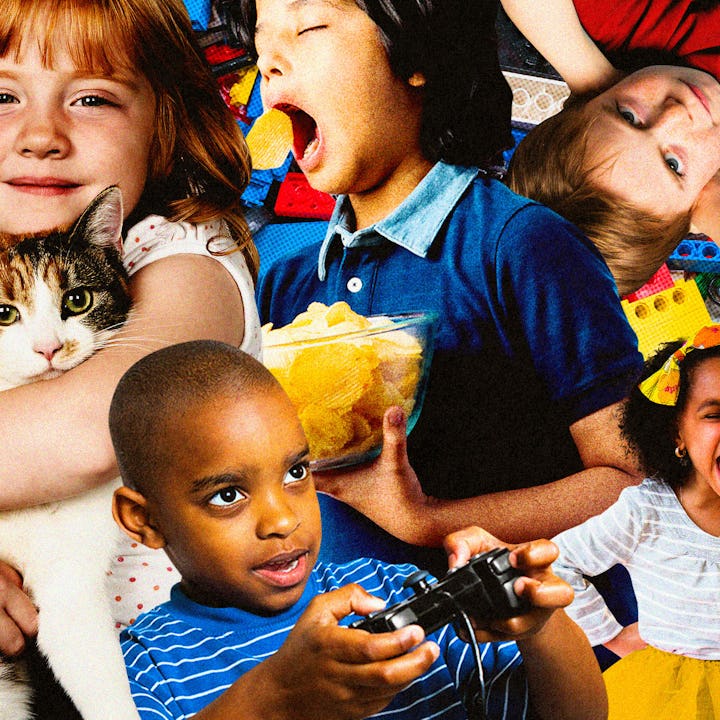You’ve Gotta Teach Your Kids How To Act On A Playdate
I get that they’re kids and no one is perfect, but I just want to teach my kids how to be good guests.

I’m far from a perfect parent. I try to cut other parents all kinds of slack — we’re all tired and just trying to do our best. No one handed us a catch-all parenting manual when our kids were born, and we’re all learning as we go.
But we need to talk about playdate behavior.
My oldest kids are 9 and 6. They attend a small school, so I know most of their friends’ families and I’m comfortable dropping them off for playdates at their homes and hosting their friends at my home without parents present.
What I’m not comfortable with is constantly correcting those little visitors.
Nothing egregious has happened, but there has been some behavior I would not be pumped to see my children doing at someone else’s house. I’ve had to stop a 5-year-old from picking up my toddler daughter and swinging her around. I had to stop another 5-year-old from chasing our cat after I repeatedly told him not to because our cat bites when provoked. I’m still finding LEGOs behind furniture from when a 7-year-old decided to launch various Avengers ships across the room during a pretend battle (doesn’t he know how long those things take to build?). I had to inform an 8-year-old that I am not a short-order cook when he asked if I could heat up his food later because he wanted to keep playing video games when lunch was served.
Then there was the time when a child (the aforementioned cat chaser) pulled every toy from every bin in my living room, including several games with small pieces. His mother arrived, surveyed the room, and informed him he had to help clean up before leaving. He said OK, ran into the kitchen and asked for a snack to go, then bounded out the door without cleaning up a thing.
After they left, I turned to my children and said: “You have to help clean up toys you play with at other people’s houses, and please never ask for a ‘snack to go.’”
Curious to know if this is part of a wider trend of mannerless children, I called Tamara Mose, a sociology professor at Brooklyn College and the author of The Playdate: Parents, Children, and the New Expectations of Play, for more. Mose told that while kids did lose some socialization time during the pandemic, good manners is going to be an ongoing lesson no matter what.
“I’m sure there has been a delay in socialization for children, given the pandemic, but they were still socializing, right? They were still socializing within their family structure,” she says.
“They probably were getting away with a lot more in the home for those two years, that maybe does not translate to other people’s homes” such as saying please and thank you all the time, she adds.
She stressed we should cut kids some slack because we may not know what they’re dealing with — perhaps they’re neurodivergent and some situations are harder for them.
If that’s the case with your child, she says, it’s helpful for you to give the parent hosting the playdate a quick heads up, just as you would if your child had a food allergy.
Parents should also feel free to let other parents know that their kid is ignoring the rules if safety is a concern.
“If you were telling a kid not to pick up a cat and they kept touching the cat or whatever, I might tell the parents, ‘Just a heads up for next time we have a playdate, can you just tell Bobby or whoever to please not touch the cat — the cat doesn’t like it and I really don’t want him to get scratched or bitten or anything,’” she says. “I would err on the side of, if it’s about safety, then letting the other parent understand, ‘Hey, this happened, and can you just speak to them about why that might be dangerous?’”
But otherwise, parents don’t need to tattle on their kids’ friends.
“Kids have to figure things out, too. … We all had to learn how to deal with the bully on the block. We all had to learn how to deal with the shy kid on the block or the gregarious one on the block,” she notes. “Everybody has these different personalities, and the only way we really get to learn how to interact with them is by interacting with them.”
When I drop my kids off for a playdate, I wonder how they act. Other parents say they’re quiet and well-behaved, but I don’t tell them when their kids are rowdy and forget their manners, so I assume they don’t tell me either. But I’ve tried to instill in my kids that they need to abide by other parents’ rules and they need to be polite. I remind them to shut the door when they use someone else’s bathroom, and I tell them not to eat five slices of pizza in one sitting the way they do at home. And if I thought they were truly misbehaving, maybe I’d start going with them on some of their play dates just to make sure.
“To me, that’s always the measure of whether or not your kid is actually absorbing anything, right? It’s how they behave in someone else’s home,” Mose says.
Lauren Davidson is a Pittsburgh-based writer and editor focusing on parenting, arts and culture, and weddings. She has worked at newspapers and magazines in New England and western Pennsylvania and is a graduate of the University of Pittsburgh with degrees in English and French. She lives with her four energetic kids, and one affectionate cat. Follow her on Twitter @laurenmylo.